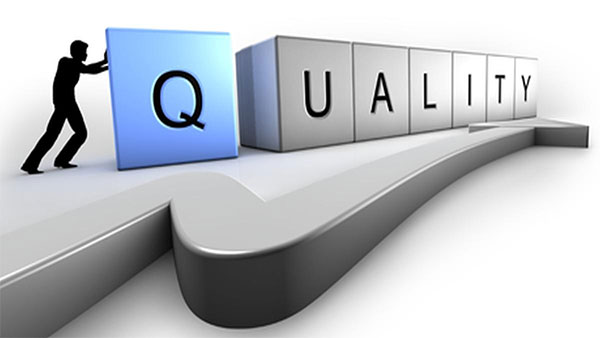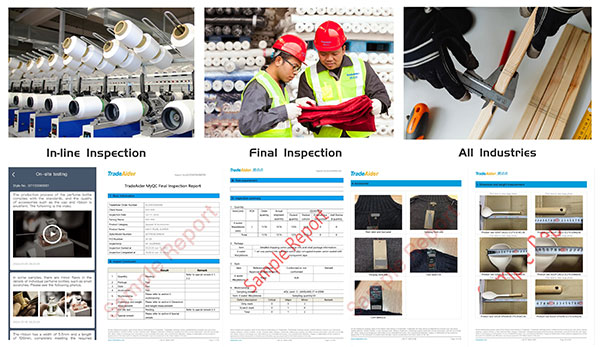
The core responsibility of the quality assurance agency is to ensure that products or services meet specific standards and are defect-free before delivery to customers. The quality assurance agency ensures the stability and reliability of product and service quality by developing and implementing quality management systems, conducting quality inspections and audits, providing improvement methods and training, as well as collecting information and coordinating feedback.
TradeAider's professional network and quality assuarance system consisting of over 80,000 quality control specialists scattered just near the factories worldwide and the specially developed Apps of digital supply chain management & quality control. This has enabled TradeAider to get involed intensively throughout the entire production journey and initiate the quality guarantee work the FIRST day when the orders are placed with the manufacturers directly by buyers. Every aspect of production will be strictly controlled by TradeAider teams and be transparent and continuously monitored in real-time by buyers through the TradeAider App. This monitoring spans the entire production process, safeguarding against any last-minute surprises and ensuring the successful GUARANTEE of the product quality.
1.Quality assurance agency for manufacturing product quality testing
In the manufacturing industry, the quality assurance agency is responsible for conducting comprehensive quality inspections and assessments on raw materials, semi-finished products, and finished goods. Through rigorous sampling inspections and performance tests, it ensures that products meet industry standards and customer requirements. Additionally, the quality assurance agency monitors and evaluates the production process, promptly identifying and correcting issues during production to improve product quality and production efficiency.
TradeAider's quality assurance service adheres to the 4R principles: Right Persons, Right Time, Right Place, and Right Thing. They deploy professional Quality Control (QC) experts with robust production backgrounds, each specializing in different products. Their intervention occurs at the early and mid-stages of production, avoiding last-minute rushes. They position themselves directly at the production lines, not merely at Finished Product Warehouses. Their commitment to transparency ensures that they report the reality to clients promptly through their MyQC App, fostering trust and accountability throughout the production process.

2. Improvement of service quality in the service industry
For the service industry, service quality is a key factor in customer satisfaction. The quality assurance agency helps companies improve service quality by supervising and evaluating service processes, service standards, and service quality. By establishing service standards, training service personnel, and collecting customer feedback, it ensures that the service process meets the norms and meets customer needs.
3. Food safety field
In the food industry, food safety is related to the health of consumers. The quality assurance agency conducts strict supervision and testing of food production, processing, storage, and transportation to ensure that food meets hygiene standards and safety requirements. By testing and evaluating issues such as food additives and pesticide residues, the agency safeguards consumer health.
1. Ensure product quality
The quality assurance agency ensures that products meet standards and specifications by conducting strict quality control and testing, thereby improving the reliability and durability of the products. This is of great significance for enhancing the corporate image and increasing consumer trust.
2. Improve service quality
By establishing service standards and training service personnel, the quality assurance agency helps to improve service quality and meet customer needs. High-quality service can enhance customer satisfaction and loyalty, bringing long-term stable benefits to the enterprise.
3. Ensure food safety
In the food industry, the quality assurance agency bears a significant responsibility for food safety. They ensure that food meets hygiene standards and safety requirements through strict supervision and testing methods, safeguarding consumer health. This is of great significance for maintaining social stability and promoting economic development.
1. Smart Sampling
Using intelligent sampling methods can avoid biases and errors in traditional sampling methods, improving the accuracy and representativeness of the sampling. Through data analysis techniques, the quality assurance agency can more precisely determine the sampling range and quantity, thus more accurately assessing the quality of products and services.
2. Use advanced quality management systems
The adoption of advanced quality management systems can improve the efficiency and accuracy of quality assurance work. These systems usually have features such as automation, intelligence, and visualization, which can help quality assurance agencies collect, organize, and analyze data more quickly, and identify and solve problems in a timely manner.
3. Establish a data-driven quality strategy
A good quality assurance plan should be based on a data-driven quality strategy. By analyzing and mining historical data, the quality assurance agency can identify the root causes and trends of quality issues, and formulate more targeted improvement plans and strategies. A data-driven quality strategy can help the quality assurance agency better predict potential future quality issues and take preventive measures in advance.
The quality assurance agency plays a crucial role in ensuring product quality, enhancing service quality, and safeguarding food safety. By utilizing intelligent sampling, employing advanced quality management systems, and establishing data-driven quality strategies, the quality assurance program can be made more effective and efficient.